Recently, there has been ample media coverage regarding the suicides of homosexual youths who have been mercilessly bullied to a horrible breaking point. In lieu of these tragic events, the WJ community can reflect upon how it treats gay individuals in this area, and if there is any abuse occurring.
The Gay Straight Alliance (GSA) purpose is to supports gay rights and promote diversity and the end of discrimination based on sexual orientation or gender identity. WJ’s first club of this sort, founded in the late 1990s, was called “Outlook.” This fell apart when the founder graduated, and was reestablished again in 2006 as the GSA.
“One thing that’s unique about the GSA is [that]… traditionally we’ve had two vice presidents,” said its sponsor, Isabel Hernandez-Cata.
For this reason, the GSA has a dual purpose. One of the vice presidents focus on the club’s goals of fighting for gay rights, both in the present and in the future. The other vice president is in charge of coordinating social actions, the club’s other purpose.
“The only reason there has to be a GSA at all is because we’re bullied so much in the regular community,” said GSA president Ilana Kapit. “We’d love to be treated like everyone else.”
The GSA takes part in many activities that promote its overall purpose. These activities include National Coming Out Day and Ally Week, in October, and the Day of Silence in April. Also, the Alliance has hosted an Activism Fair.
“For political activities, we try to make a big deal of the ones we do,” said Hernandez-Cata.
She said that if the club was to take part in too many activities, it would not receive all the attention that it deserves, so it just focuses on a few major ones.
In addition to being a safe place for students to be themselves, the GSA provides students, both straight and gay, with a tight-knit community, not only at WJ but within the gay community of the area. WJ’s GSA and the GSA of Churchill went ice skating, bowling at gaming Dave and Busters. Also, the GSA of Churchill is planning a “Gay-la,” which is open to all but will be a “predominately homosexual event.” This event is especially meaningful for those who do not feel comfortable going to their school’s regular prom with a same-sex partner.
“Some of [the GSA’s members] are perfectly comfortable expressing an alternative social identity,” said Hernandez-Cata.
However, some members feel uncomfortable expressing their sexual identities in public, and some have not even come out yet to their parents and peers.
In total, the club has around 30 active members, and dozens more who do not attend all of the meetings but help out with events. There are also some who only observe the Day of Silence. For example, members of the Peace and Social Action club sometimes helps with GSA initiatives yet are not official members.
“For the GSA to be effective, we need to have a lot of allies who are not necessarily active members,” said Hernandez-Cata.
WJ is close to Washington, D.C., where the community is considered extremely tolerant when it comes to diversity. However, people may not realize that there are still hurtful acts committed against openly gay individuals at WJ.
“There is a lot more harassment than people believe there is, but it’s because most of it isn’t physical at all,” said Kapit. “Some of it isn’t even verbal. It’s the nonverbal harassment that’s the worst. It’s the people who step out of my way when my girlfriend and I are coming, or the people who give me dirty looks that really get to me.”
Although abuse at WJ is limited, around the nation, there continue to be a lot of bullying and suicides.
According to Mental Health of America, “gay, lesbian and bisexual youth are two to three times more likely to attempt suicide than their heterosexual counterparts.” This emphasizes the necessity for the GSA to exist.
The American Foundation for Suicide Prevention states that more than 34,000 people in the United States commit suicide every year, meaning that statistically 90 Americans take their own lives in any given day. Suicide is ranked as the third leading cause of death among 15- to 24-year-olds.
“[I] see some really awful things happening in other schools and then [I] realize that this place is great,” said Hernandez-Cata. WJ’s teachers, administrators and counselors are trained and supportive in helping gay and transgender students cope with their difficulties. Also, the library staff created a LGBT collection with information and literature for students.
“Based on what I hear in the news, I think this is a pretty safe place to come out now,” said Hernandez-Cata, “[but] there is some bullying [in the area], albeit subtle.”
The issue of bullying has received a lot of attention from influential people like President Barack Obama and singer Lady Gaga.
In one speech at the “Gala With the Gay Community” in Manhattan this summer, Obama said, “I believed that discrimination because of somebody’s sexual orientation or gender identity ran counter to who we are as a people. It’s a violation of the basic tenets on which this nation was founded.”
Similarly, Lady Gaga’s songs “Born this Way” and “Poker Face” encourage people to accept people for who they are.
Whether students at WJ are gay or straight, they should know that they are always welcome in the GSA, where acceptance is key. However, it is still important to note that around the nation, acceptance is still a major issue.
—
Personal Accounts
Anonymous:
When I first came out to my parents, the last word I would have used to describe their reaction was “happy.” They were confused, taken by surprise and definitely not accepting. At first, all I wanted to do was take it back and say I was just in an emotional state and didn’t know what I was saying. I did do that the first time. Then I realized I couldn’t pretend I was someone that I wasn’t, so I came out again. This time, I didn’t back out. At first I felt like I would have to deal with my disapproving parents forever and I would never be able to be openly gay around them, but they came around. I think it’s normal that parents take a while to get used to their children belonging to the LGBT community. I can’t imagine knowing someone for fifteen years and then hearing they’re a lesbian. I would have to alter every thought I ever had about their relationships, or their friendships or even their future. So to all the teenagers out there struggling with disapproving parents, or parents in denial, just remember that it really does get better. There’s no way for a parent to stick to the same negative mentality regarding something that obviously isn’t going to change, especially when it’s their own child.
—
Steven Groobert:
I first came out to my group of friends. With a stutter and my nerves jumping out of my skin, I openly came out as bisexual. The immense fear I felt before their response was unbearable, only to get the reassuring rush of their “okay”s, and then their going on to talk about whatever. As I came out to more people I realized the community was accepting and was happy that I was “being me.” I found comfort with my friends as they supported me, and I found the GSA to be a helpful idea, since people were there to support me and were going through the same thing. As with any area, aside from maybe San Francisco, some people are closed-minded to the idea of homosexuals. I’ve been called a “fag,” and I’ve lost friendships, but in the end, you’ve just got to let it roll off your shoulders. As a wise man once said, “No one is in control of your happiness but you…”
—
Ilana Kapit:
I knew from the beginning that coming out was going to be hard, but that I had to do it. There was no way that I could hide this part of me anymore, especially when I felt like, along with my sexuality, I was revealing this whole new person. When I cut my hair sophomore year, the coming out happened for me. The people who didn’t know suddenly did, and I was now this confident and out-there lesbian. The hardest part has been people deciding that since they know that I like girls, there is nothing else about me worth finding out. Obviously, that’s not true, but they don’t know that. The only real bullying that I’ve received are the nonverbal behaviors that I sense every time I’m around someone who is uncomfortable with my sexuality. When they give me a look, or move away, it hurts. I’m still me, and just because I’m dating a girl, it doesn’t make me deserving of homophobic behaviors. I’m still a person and all I want is to be treated as such.


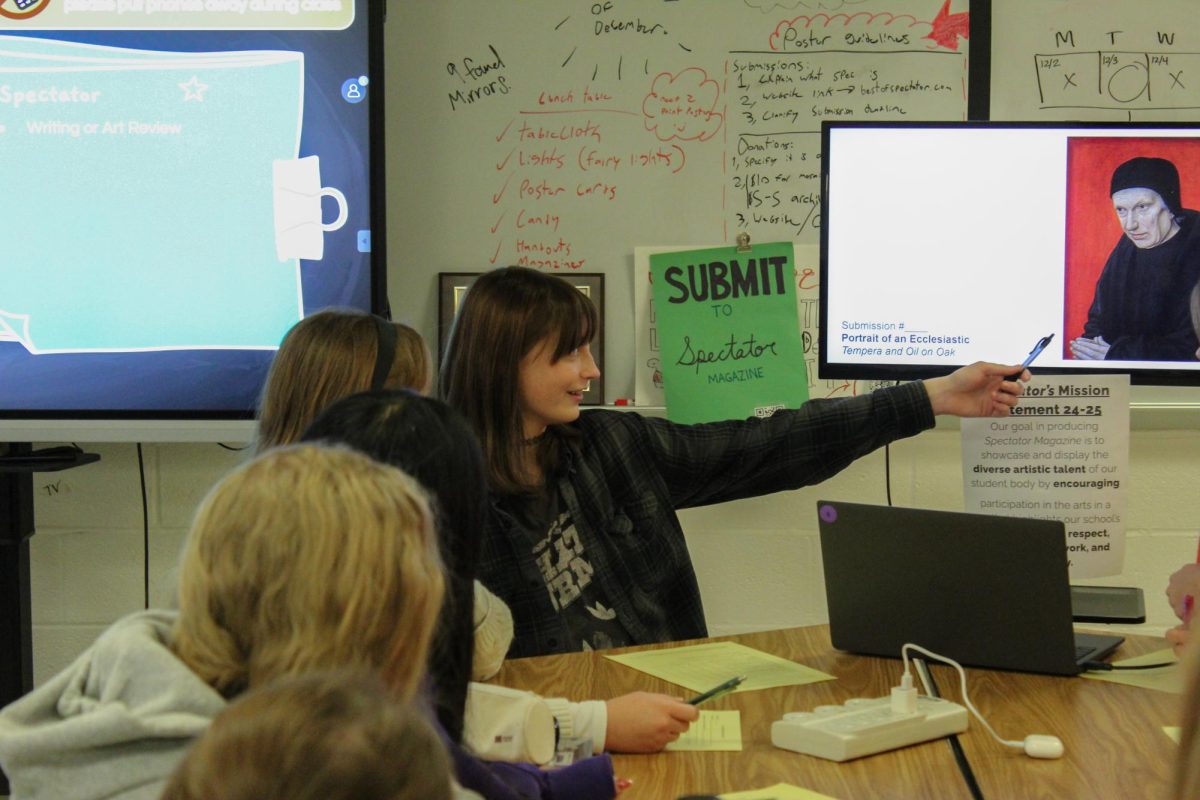
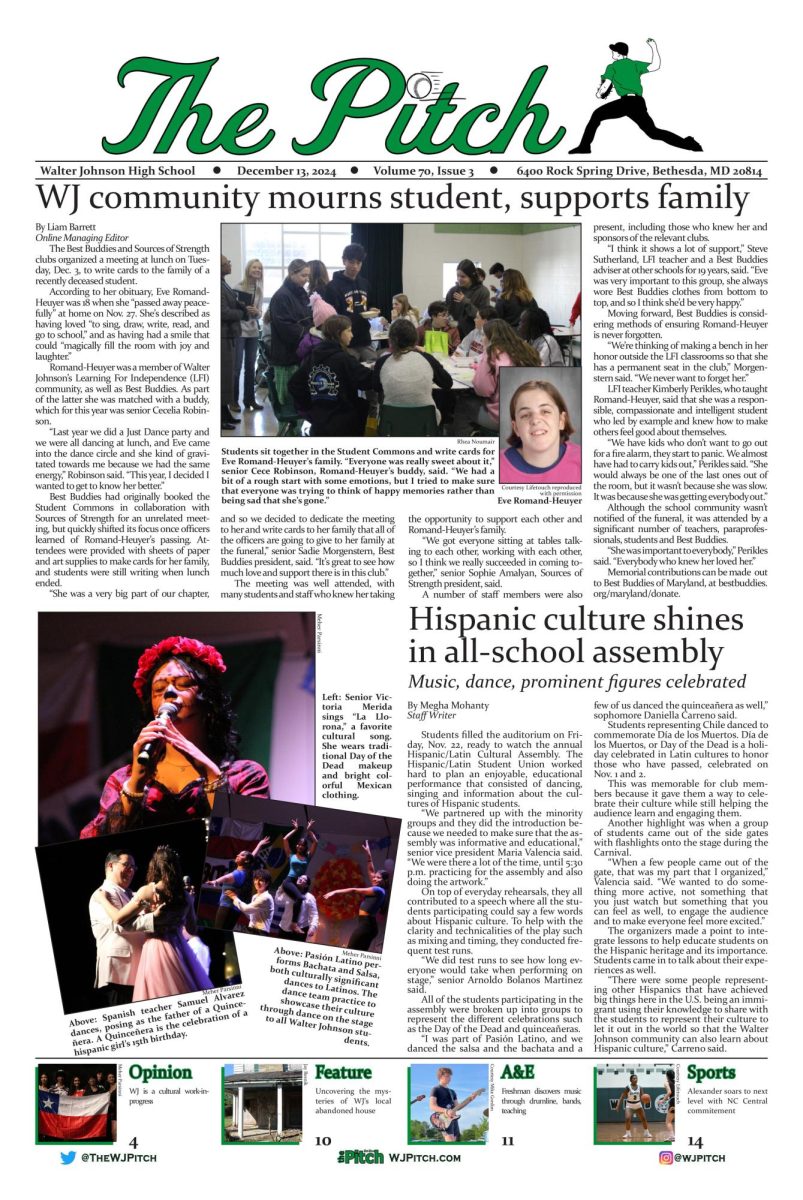
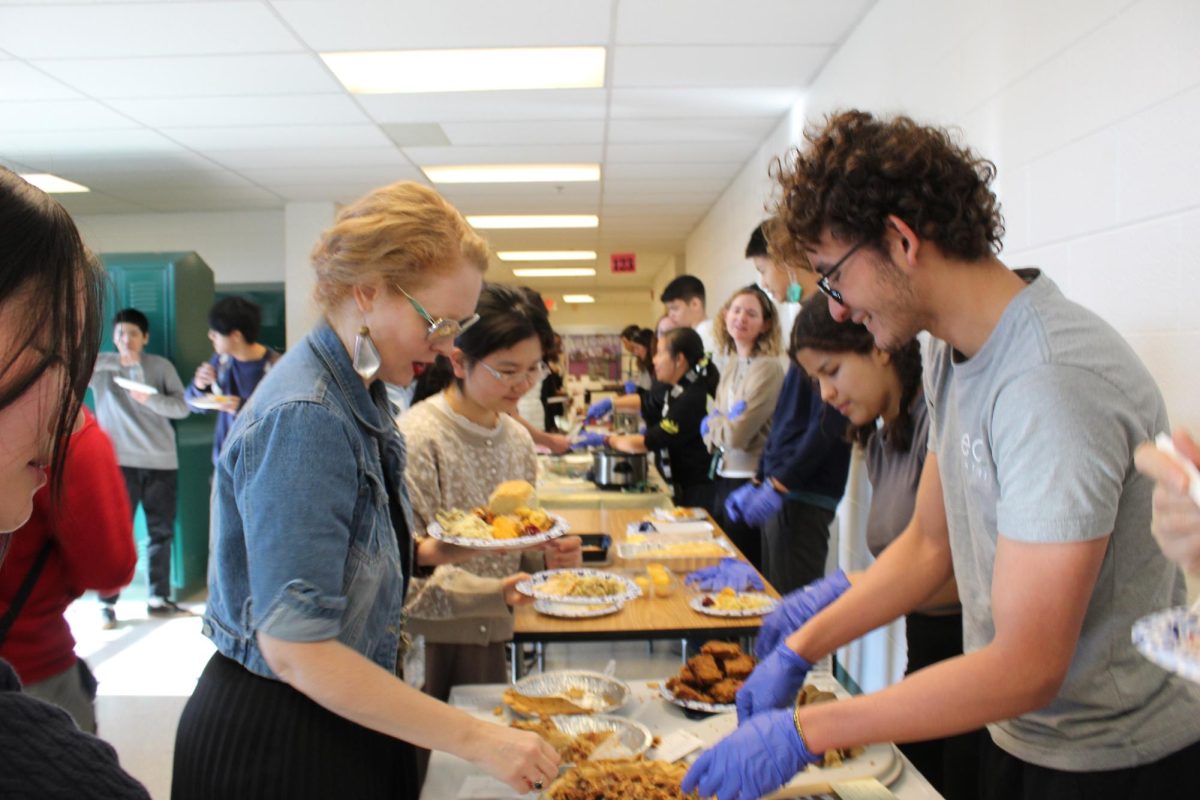
![Social studies teacher Timothy Rodman holds a production factory simulation in his AP Microeconomics class. "Students remember running for class president or the mock congress or the production factory much more so than learning topics like circular flow," Rodman said. "[The simulations make learning] very tangible and real and then students down the road are able to use it."](https://wjpitch.com/wp-content/uploads/2024/11/IMG_4420-1200x675.jpg)
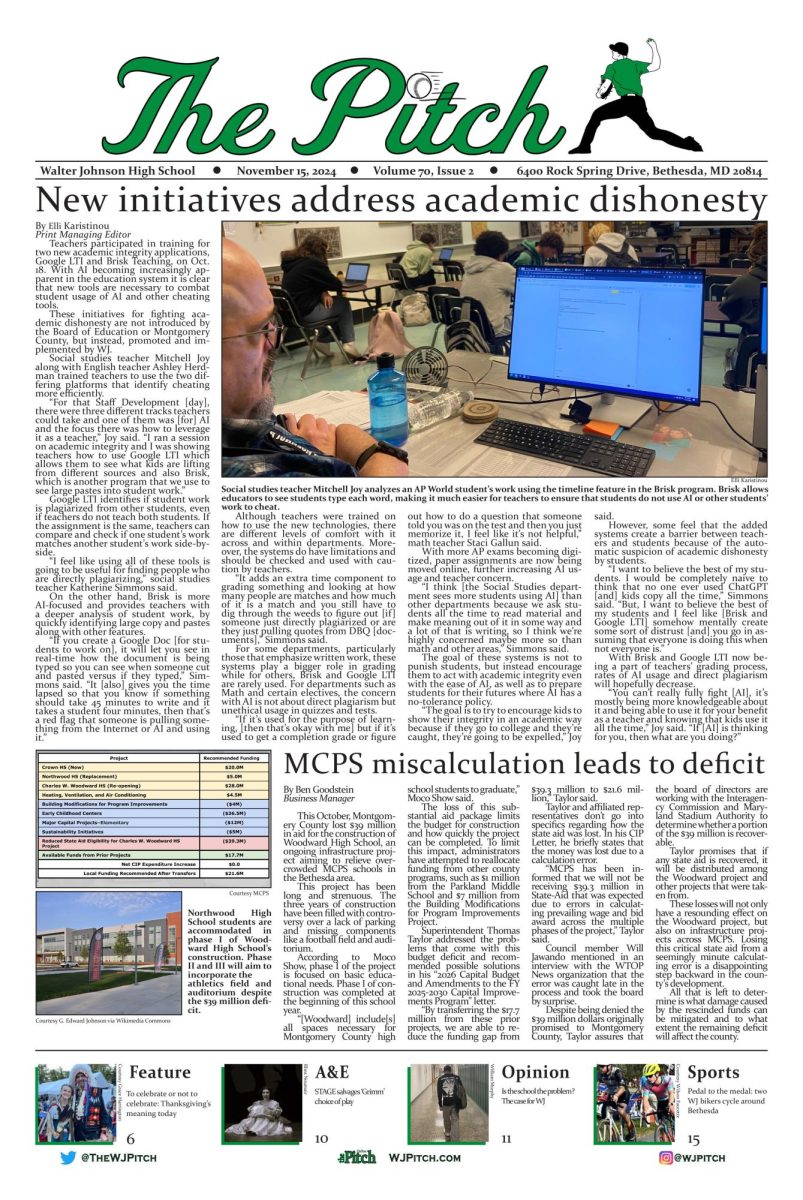
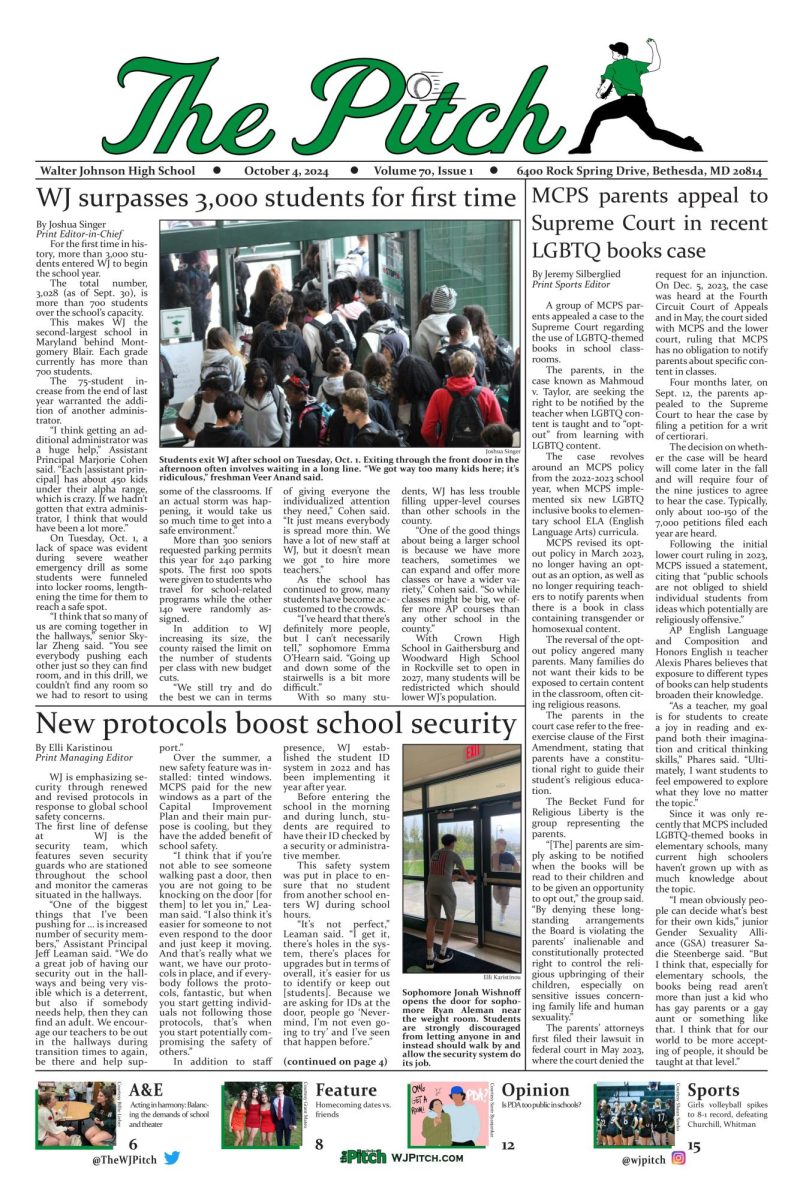





![Senior Tiffany Gibson has dinner with her parents and her nine year old sister. Gibson's family has been her largest source of support throughout her treatment process.
"[My dad] helped me through it. He was the one who’d take me to my doctor’s visits, he was trying to make me try to take my medication on time, even though he’d get angry when I didn’t take it. I had to do blood work, so he would always find out. He would always try to get me to take it and remind me," Gibson said.](https://wjpitch.com/wp-content/uploads/2023/03/92iA4Tg7fGWMhmk9DKWf7Q6UQQ4p0LYeBobwwvV7-900x672.jpg)